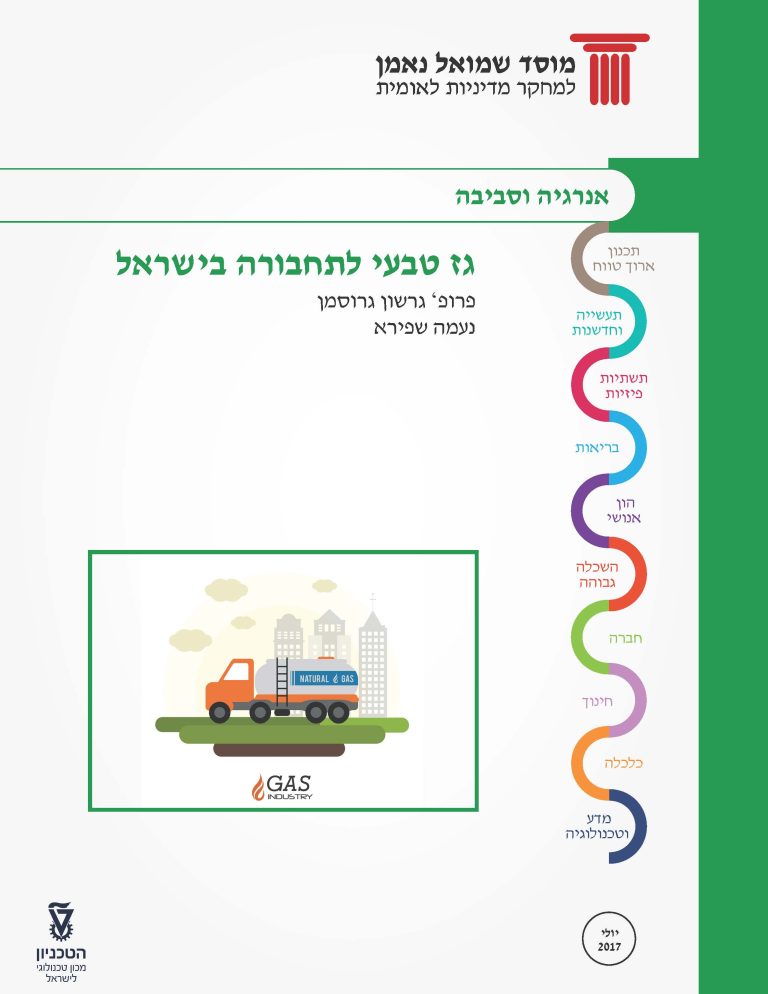בעיית זיהום האוויר, כתוצאה מפליטת מזהמים בגזי פליטה של מנועי רכב, הולכת ומחריפה, בעולם ובארץ – במיוחד במרכזי הערים. הגז הטבעי הדחוס (CNG) – נחשב כיום כדלק החלופי המבטיח ביותר בגלל זמינותו ויתרונותיו האקולוגיים. בעולם פועלים מיליוני כלי רכב המונעים בגז”ט (גז טבעי). בישראל עדיין לא פועלים כלי רכב בגז”ט (למעט 2-3 רכבים במעמד של ניסוי), אך תגליות הגז”ט והשימוש ההולך וגובר בגז לייצור חשמל ולתעשייה מהווה הזדמנות לשוק הגז”ט לתחבורה.
לגז”ט יתרונות רבים לשימוש בתחבורה: הוא זול מן הסולר, הינו דלק “נקי” אשר עונה על הדרישות להפחתת פליטת מזהמים באוויר והפחתת רעש, אינו מזהם את הקרקע והמים, קל יותר מהאוויר ועל כן נדיף ובטוח מאוד לשימוש, בשונה מגפ”מ (גז פחמימני מעובה). ניתן להסב רכב קיים לעבודה עם גז”ט או בשני דלקים (bi fuel). מרבית היצרנים מציעים כלי רכב שתוכננו במיוחד לשימוש בגז”ט (עד 400 כ”ס).
ממשלת ישראל קיבלה החלטה ב-2010 לעודד את השימוש בדלקים חלופיים לתחבורה ובראשם הגז”ט. משרדי הממשלה נרתמו למשימה: משרד התחבורה פרסם כי יעניק כ – 150 אש”ח לכל אוטובוס שיונע באמצעות גז”ט (נובמבר 2015). המשרד להגנת הסביבה מקצה משאבים לעידוד צמצום זיהום האוויר בתחבורה הכבדה (אוגוסט 2016). משרד התשתיות הלאומיות מעודד שימוש בגז”ט לתחבורה והוציא מכרז לעידוד הקמת תחנות תדלוק בגז”ט בהיקף של 65 מיליון שקל (אוקטובר 2016). משרד האוצר יקבע את שיעור המס לגז”ט לתחבורה.
על אף כל אלה, משק הגז”ט לתחבורה נתקל בקשיים וחסמים רבים בהיבטים הרגולטוריים, אשר מעכבים את התפתחות משק התחבורה המונעת בגז”ט. בין החסמים ניתן למנות חוסר בתשתיות תדלוק, עלויות הקמה גבוהות לנקודת תדלוק עם בעיות ייחודיות בשל הצורך להתחבר למערכת חלוקת/הולכת הגז, ועלויות הסבת מנועי דיזל לגז”ט. בנוסף, טרם ניתן לקבוע את מחיר הגז לתחבורה בישראל עקב אי-ודאות באשר למיסוי (בלו) אשר יוטל.
סך שוק הגז”ט בעולם כולל כ-23 מיליון כלי רכב ולמעלה מ-28 אלף תחנות תדלוק בגז”ט. בקליפורניה, בה מחיר הדלקים השונים דומה, החליטו בעידוד המדינה כי אוטובוסים להסעות תלמידים יונעו בגז”ט. באירופה ובארה”ב שיעורי חדירה גבוהים בציי רכב עם מסלולים מעגליים יחסית קצרים, כגון אוטובוסים עירוניים ומשאיות פינוי אשפה. שימוש רחב ב-CNG לרכב באירופה מחייב פריסת רשת של אלפי תחנות CNG בכל מדינות היבשת (בינואר האחרון התפרסמה דירקטיבה חדשה של האיחוד האירופאי שמדברת על הנושא).
משתתפי הפורום תמימי דעים באשר לתועלות הצפויות מהסבת התחבורה הכבדה בישראל לגז”ט. גז”ט הינו כלכלי גם למשק וגם לצרכן מסיבות רבות. מדינת ישראל שואפת לעצמאות אנרגטית, כאשר כיום ייצור החשמל בגז”ט מגיע להיקפים של 70%-60% מסך הייצור, ושואפים להגיע למצב דומה גם בתחבורה. בנוסף יש יתרון משמעותי לגז”ט בנושא של פליטת מזהמים.
המלצות:
- יש חשיבות מכרעת להסברה נכונה כדי לקדם את הנושא. הממשלה צריכה להירתם לכך בכל הערוצים האפשריים: להקים מוקדי שטח, לדבר עם כל מפעל, עירייה, בעל צי רכב, להסביר ולשווק את היתרונות הכלכליים והסביבתיים שבמעבר לשימוש בגז”ט בתחבורה הכבדה. בנוסף, חשוב להדגיש את ההבדלים המהותיים בין גז”ט לגפ”מ.
- הממשלה צריכה להפסיק לתמוך בגפ”מ ולשחרר את הכסף לטובת גז”ט. גפ”מ, שהינו תזקיק של נפט גולמי, אינו מהווה גיוון במקורות האנרגיה של ישראל ואינו תורם בסוגיה של הפחתת מזהמים.
- נדרשת פעילות ממוקדת להסרת חסמים סטטוטוריים בכדי לאפשר קיצור זמנים הן לפריסת רשת ההולכה והחלוקה של הגז והן להקמת תחנות תדלוק.
- סנכרון – צריך לקחת את כל התמריצים (בלו, הקמת תחנות תדלוק ושדרוג רשתות החלוקה), ולסנכרן אותם אחד עם השני, וכן לסנכרן עם לוחות הזמנים האמתיים, כך שהעלאת הבלו תתרחש לא לפני 2030. זה ייתן למשק אורך נשימה וגם יצור ודאות.
- מומלץ לאשר טכנולוגיות לשימוש בתקופת המעבר, כגון מכלית/תחנת תדלוק ניידת, עד להקמת תחנות תדלוק קבועות.
- בכדי להרחיב ולמטב את המידע לגבי פליטות לאוויר וזיהום אוויר מתחבורה בישראל, מומלץ לקדם בדיקות באמצעות מכשור ייעודי למדידת פליטות מכלי רכב בפועל ולא להסתמך על הצהרות יצרנים.












